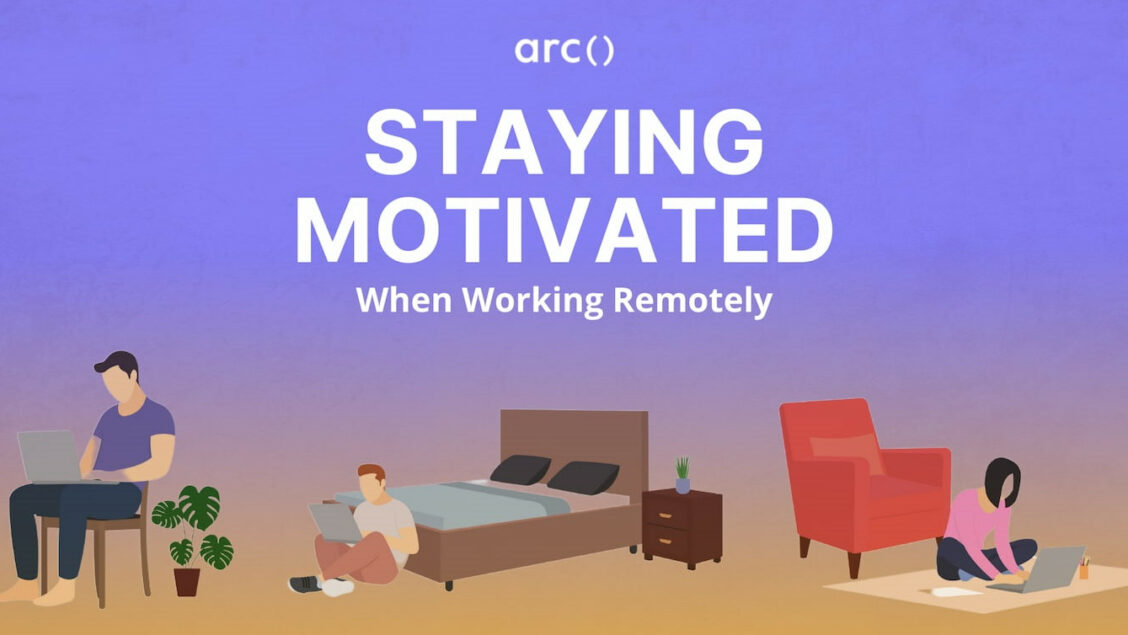People that have never worked from home tend to romanticize remote work — and while it does provide a level of freedom an office worker doesn’t always have, there’s definitely a darker side to that coin.
There are tons of distractions in every home, even without the added stress of COVID-19 — from pets and family members to social media, daytime TV, and household chores. In the end, your comfy sofa cushion and pajamas don’t necessarily provide the same level of motivation you’d have when surrounded by your colleagues in an office building.
Even when everything quiets down or you’re home alone, it becomes increasingly hard to remain productive, get everything done, and stay on task. But it’s definitely possible with the right toolkit. With that in mind, we’ve decided to give you a couple of tips on dealing with a lack of motivation when working remotely as a software developer.
Looking to hire the best remote developers? Arc can help you:
⚡️ Get instant candidate matches without searching
⚡️ Identify top applicants from our network of 350,000+
⚡️ Hire 4x faster with vetted candidates (qualified and interview-ready)
Try Arc to hire top developers now →
1. Practice Self-Care
Your own wellness should be your biggest priority when working from home. If you’re constantly running on fumes (or rather, sugar and caffeine) you’ll never achieve your best as a developer. So, you need plenty of rest, a healthy diet, and proper stress management to be at your peak.
Of course, meeting all of your emotional, physical, and (especially) social needs is tough in a remote environment — even without COVID-19. And when you’re forced to limit your interactions with colleagues to video chatting, it’s even more important to employ enough self-care in other aspects of your life.
Every now and then, take the time to ask yourself what you could be doing to take more care of yourself. If you’re finding loneliness, communication challenges, or the lack of in-person oversight that comes with remote work to be difficult, think of the steps you can do to alleviate problems on your end.
Exploring some of the best self-care books can provide additional insights and practical strategies for maintaining your overall wellness and mental health. And if you enter crunch time and your stress levels soar, make sure your self-care follows suit.
2. Establish a Schedule
One of the biggest misconceptions about working remotely is that you’ve got more free time because you can work whenever you want. First of all, plenty of software development companies work fixed hours even in a remote environment to make sure remote collaboration is feasible in practice.
And secondly, if you do get flexible hours and work at home — you’ll be surprised how easy it is for work to get away from you. Soon enough, you’ll find yourself in accidental overtime more and more if you don’t create a strict schedule. There’s also the morning slacking that some people default to when working from home; slowly shifting your work hours later and later into the day. After a while, these people’s day will be completely wrecked because they’re procrastinating during the day and working late into the evening.
The lack of a fixed schedule can hurt more than your private life and free time — without a structured workday, it’s far easier to become distracted and get off track while working. Tasks that should take 20 minutes will end up lasting a couple of hours.
For all of these reasons, you need a clear, strict schedule — and the willpower to stick to it. Pick the exact hours when you’ll start and finish work, and do your best to make them a habit.
Read More: Remote Work Glossary: 50+ Words and Phrases on WFH & Virtual Careers
3. Use Remote Best Practices to Work Effectively
A key part of avoiding remote work burnout, and staying motivated, is embracing remote work best practices. Importantly: don’t just try to recreate the office from home. If you end up spending all day in video calls, not only will you not have time to code, but you’ll also feel exhausted.
Some things to try:
- Embracing written-first communication practices, like prioritizing written asynchronous communication.
- Only set up meetings if necessary (and share an agenda in advance).
- Send regular written status updates to your team, and proactively tell others if you’re stuck.
- Proactively reply to messages, or leave an emoji reaction on them, so people know you’ve seen them.

Arc is the best place to find great remote jobs. Find great remote jobs at top startups and tech companies. Freelance and full-time remote opportunities are available.
Sign up here
4. Create a Dedicated Workspace
The infamous “you get to work from your bed/couch” is the first thing you’ll hear from most people when you tell them you work from home. And it’s something you’ve probably done at some point since becoming a remote software engineer developer — it’s hard to resist the most comfortable spots in your house.
However, it’s not long before you notice this arrangement is just not working out. First of all, even if your back can handle the pressure, working from your bed means you’ll start associating your bed with your job — which will likely wreak havoc on your sleep patterns. This can, in turn, affect your productivity the following day.
And even if you’re getting enough sleep, let’s face it — your bed is far from the most productive place you’ve worked in. It’s easy to get lulled into a nap or procrastination, even if you’re on your couch. At the end of the day, you still need a desk. If you don’t have a home office or the space for a separate work desk, carve out a specific part of your kitchen table and reserve it for work.
Read More: How To Use Social Media Thought Leadership To Level Up Your Career
5. Take Regular Breaks
When you’re constantly sitting at home, sticking to a regular work schedule can be tough — it’s much easier to become bored and procrastinate, especially when you’re working on a task that’s not interesting to you. And when you know something is going to be frustrating, challenging, or just plain boring — even getting started is hard.
This is why you should get into a regular rhythm of work and breaks, and it’s one of the most important work from home tips you could follow. There are a couple of great tactics for this — the Pomodoro Technique is especially popular among office workers. Basically, the technique involves using a timer to divide your work into 25-minute chunks with short (5 minute) breaks between each one and longer breaks after every 4 work chunks.
After just a few days, this rhythm will be completely natural to you and time will fly by regardless of whether you’re working on interesting or menial tasks.
6. Limit Distractions
Generally, working in an office offers few interruptions and distractions — after all, everyone around you is on the same page and trying to be as productive as possible. However, distractions are plentiful when working from home, and you may find it more difficult to continue working every time you’re interrupted.
In that case, limiting your surrounding distractions is a must. For one, you need to put your phone on “Do Not Disturb” or just turn off your notifications and check your email through your desktop browser. Only allow yourself to use the phone after all the work is done, or during a longer break.
Of course, there are other things that can cause a significant and constant distraction — like your kids. People who work from home and have children around will need to keep them occupied with content and tasks to reduce distractions. So, make sure they’re busy and check on them from time to time.
Naturally, they will have to interrupt you sometimes — but you need to set some ground rules about what’s a legitimate reason to interrupt your work. You can always give them small rewards if they behave well on their own and don’t cause too many distractions.
Read More: 5 Ways to Stand Out & Get Noticed in Your Current Development Job
7. Reward Yourself
Speaking of rewards — if you’re going to stay motivated when working remotely, you’ll also need to reward yourself from time to time. Using this simple method to motivate yourself on a daily basis is just one of the many things you’ll have to do to keep to a fixed schedule.
For instance, you can decide to watch a couple of episodes of your favorite TV show in the evening, provided you finish all the work by 6 PM. Or, let yourself eat some treat if you’ve managed to stick to your self-care and workout routine throughout the week.
You’d be surprised just how much a string of smaller incentives can help you in getting all the work done on time and efficiently.
8. Find Challenges
Of course, rewards don’t provide enough satisfaction if the work isn’t challenging enough. If you’re going to advance in your career as a software engineer, try to challenge yourself to complete extra work each day — it’s not about the bare minimum your team lead is asking for.
Soon enough, you’ll find that the combination of small rewards and constant challenges is making your work just as interesting at home as it would be at a real office. It will also help you maintain focus and remind yourself why you need to stay productive even without someone providing physical oversight.
Read More: Here’s When You Can TRULY Call Yourself a “Senior” Software Developer
9. Schedule Time To Chat With Colleagues
It’s easy to feel isolated and lonely when working remotely, and this is a big drain on motivation. And if you’re used to being able to build personal and professional bonds with your colleagues by walking past their desk for a chat, make sure you’re doing this virtually too.
Occasionally get in touch with other people on your team to talk about non-work stuff — whether in an online chat app, or by video call. You can also take things further with virtual gaming or helping suggest online team bonding activities. It’s important to let others know if you’re feeling isolated, and do something about it!
10. Experiment Constantly
The stuff we’ve suggested above is just the tip of the iceberg when it comes to staying motivated while working as a developer remotely.
You’ll find tons of different strategies, online communities, and pieces of advice on this throughout the internet — and while not all of them are equally effective, don’t be afraid to experiment and try out new things. That’s just another way to keep your days fresh and more varied when you’re spending most of your time at home.
And remember: working from home can be difficult even during the best of times, making remote work during the pandemic even more stressful and demoralizing. However, if you constantly strive to remain motivated, you probably will — just don’t be afraid to cut yourself some slack when things aren’t going the way you want.
Do you have any other tips for how to stay motivated when working remotely? Let us know in the comments!
You can also explore HireAI to skip the line and:
⚡️ Get instant candidate matches without searching
⚡️ Identify top applicants from our network of 350,000+ with no manual screening
⚡️ Hire 4x faster with vetted candidates (qualified and interview-ready)
Try HireAI and hire top developers now →
Read More: Got a Busy Developer Schedule? Here’s How to Keep Learning & Make Time








